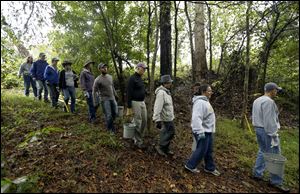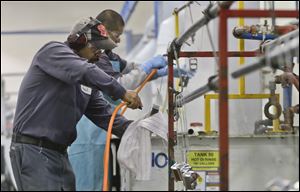
GOVERNMENT SHUTDOWN
Americans voice anger, frustration in political stalemate
10/10/2013
Kelly Rimer, left, and Laura McKelvey with the Environmental Protection Agency and other furloughed colleagues do volunteer trail maintenance work on a public canoe access point on the Eno River in Hillsborough, N.C., Thursday, Oct. 10, 2013. Rimer says, "Getting angry is not going to do any good. These guys will figure it out when they figure it out," she says. "Meanwhile, I try to be useful every day." (AP Photo/Gerry Broome)
ASSOCIATED PRESS

Furloughed employees from the Environmental Protection Agency march into a wooded area to do volunteer trail maintenance on a public canoe access point on the Eno River in Hillsborough, N.C.
The regular book study group at the Rev. Tim Ahrens’ church in middle America always ends with a prayer — most deeply personal, often about a family or friend’s illness. But after one recent meeting, the members held hands in a circle and turned to something far different.
“All they wanted to pray about is the government ... and that cooler heads will prevail,” says Ahrens, pastor of the First Congregational United Church of Christ in Columbus, Ohio. “It speaks to the fact that this is deep in the hearts of the people. There’s just a huge concern about the tenor of who we are and how we conduct the business of the country.”
With the government shutdown in its second week and a possible default just days away, many Americans view this epic political clash with frustration, anger and a stoic, here-we-go-again acceptance: They don’t like what they see, don’t agree on who’s to blame and aren’t sure what would be the best solution. But they hope that someone — anyone — comes up with a way out of the mess.
“The bottom line is there’s a logjam that’s ideological and idiotic,” says Ahrens. “What’s happening is awful. What we see is an inability for people to work together and communicate. There’s no excuse for that.”
The red-blue divide has become deeper and more ominous in recent weeks as the two parties have bickered their way closer to possible economic disaster. The White House and Democrats have opposed efforts to defund or delay the 3-year-old health care law, and President Barack Obama has vowed not to negotiate over increasing the federal borrowing authority, which would allow the U.S. to continue to pay its bills and avoid a potential government default. House Speaker John Boehner has insisted the president must negotiate on changes to health care and spending cuts to end the shutdown and raise the debt limit, though says he’s not “drawing lines in the sand.”
It’s all very exasperating to Freda Wilhite, a 75-year-old retired restaurant manager.
“I blame it on all of them,” she says, sitting in a leather armchair in the lobby of the Capital Towers senior-living building in Raleigh, N.C. “I think Obama is being kind of crappy about it. But I also think the Senate or the Congress, whoever it is, is being just as crappy for not trying to reach an agreement — do ANYTHING — to keep the government going.”
Asked which side should give in, Wilhite threw up her hands.

Freda Wilhite, 75, turns to greet a fellow resident of the Capital Towers senior-living apartment building in Raleigh, N.C. Wilhite and retired long-distance driver Andrew Goodwin, center, were discussing the budget impasse in Washington, D.C. She says, 'I think Obama is being kind of crappy about it. But I also think the Senate or the Congress, whoever it is, is being just as crappy for not trying to reach an agreement - do ANYTHING - to keep the government going.'
“Lord, I don’t know,” she says. “Somebody should give a little and somebody should give a little more. I don’t know how to fix it. I just know I don’t like it.”
Neither does Ivan Nelson, a third-generation central Illinois farmer.
“It make me angry, but the worst part of it is I’m sitting here not knowing what I’m angry about,” says the 67-year-old corn and bean farmer, taking a morning break from harvesting. “These guys created the (political) system. If they can’t live with it, they can correct it. You think they’d be smart enough to do that.”
The public frustration may cross party lines, but a new Associated Press-GfK poll held Republicans more responsible for the gridlock, with 62 percent mainly blaming the GOP for the shutdown. In contrast, 52 percent believed the president isn’t doing enough to cooperate with the Republicans, according to the survey. The poll also said 82 percent of Democrats see the shutdown as a major problem for the country, compared with 58 percent of Republicans and 57 percent of independents.
Other surveys also have found a public upset with the political process but as divided as lawmakers on Capitol Hill.
“There’s definitely a consensus that the system has become pathologically frozen and something needs to happen,” says Michael Dimock, director of the Pew Research Center for the People & the Press. “Compromise is nice in principle but still hard to reach in practice, even among the public.”
Dimock points to a recent Pew survey that found most Democrats and Republicans were not willing to budge on the Affordable Care Act as a route to end the shutdown. The poll found 58 percent of Democrats said it would be unacceptable for the president to delay or make cuts in the health care program. Almost as many Republicans — 54 percent — said GOP leaders shouldn’t accept any deal unless there are reductions or a postponement in the law.
But Dimock says it’s too soon to tell whether this latest impasse will permanently alter the public’s view of Washington. He noted that months after the 1995-1996 government shutdown, attitudes toward Republicans and Democrats were largely the same as they had been before the closing. One major reason was the economy was humming along and, he says, “when things start to feel better, public frustration tends to wane.”
Though times are now different, there’s still skepticism of warnings of an economic calamity if the debt ceiling isn’t raised.
“We’ve been told about a lot of crises recently, but the sun always rose the next day,” Dimock says. “People are a little wary when that threat is in front of us year after year after year.”
Even some of those already affected by the shutdown are taking things in stride.
Kelly Rimer, a 22-year veteran of the Environmental Protection Agency, is in her second shutdown. She says she’s not upset, but is eager to return to work. While furloughed, she and co-workers in the Raleigh area have been cleaning parks, building a fishing pier and doing other volunteer jobs.
“Getting angry is not going to do any good. These guys will figure it out when they figure it out,” she says. “Meanwhile, I try to be useful every day.”
At the other end of the country in San Diego, Dale L. Watkins Jr. says he feels “angry and powerless” watching events unfold that could hurt the company his grandfather founded in 1946.

Employees at Sheffield Platers Inc. work on the factory floor in San Diego. Since the shutdown which started on Oct. 1, the company has focused on filling previously approved purchase orders, but if the government remains closed, President Dale L. Watkins Jr. says there could be layoffs among his 70 workers.
Sheffield Platers, a small metal plating firm, gets about 40 percent of its business from the Defense Department. The company provides connectors for everything from submarines to military aircraft. Since the shutdown, it has focused on filling previously approved purchase orders, but if the government remains closed, Watkins says, there could be layoffs among his 70 workers.
“They’re gambling with our money,” he says. “All the people who are supposed to be voting on this, it really does not affect them in the pocketbook, so there’s no need for them to rush to a decision. They’re already fat and happy sitting up there.
“As the decades go by,” Watkins adds, “they continue building thicker, taller, stronger walls between the parties.”
Not everyone sees a downside in this latest political face-off.
“I think it’s actually healthy,” says Cassandra Mooneyham, 31, a conservative activist in Lake Havasu City, Ariz. “I hear people say we need to negotiate and compromise. But compromise over hundreds of years has led us to where we are today. ... We have so much debt because we have entrusted the government with so much of our services.”
Mooneyham says she doesn’t think the shutdown has gone far enough, but believes it has given the public a chance to evaluate the need for government, which she maintains is far too big. She worries any compromise will lead to an increase in the debt ceiling.
“Ultimately, someone will have to cave,” she says. “Hopefully, it’ll be the side of big government.”
At the Crossroads Cafe in Joshua Tree, Calif., near the national park of the same name, waitress Amanda Overmire has watched the shutdown put the laid-back bohemian community on edge. The park is closed, motels and restaurants are suffering, and locals are out of work.
Yet Overmire remains optimistic that when the dust clears, she and other Americans will discover that something good came out of the standoff.
“I have hope that there’s a message in their madness,” the 25-year-old says. “But I have no idea what that would be, to be honest. I just hope that the meaning surfaces.”